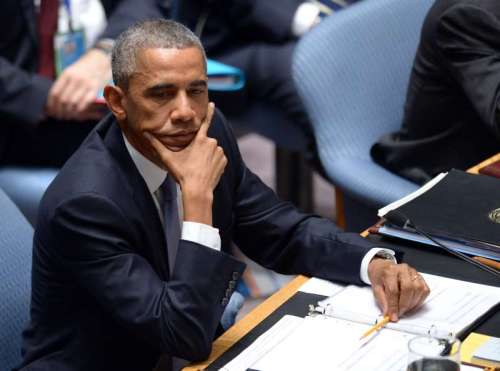
US President Barack Obama has in a television interview acknowledged that intelligence agencies underestimated the rise of the Islamic State (IS) Sunni radical group in Iraq and Syria.
“Our head of the intelligence community, Jim Clapper, has acknowledged that, I think, they underestimated what had been taking place in Syria,” Obama said Sunday on the CBS news programme, “60 Minutes”, referring to the director of national intelligence.
The president also added that the US overestimated the Iraqi security forces’ ability to fight the militant group.
Obama explained that the radical Sunni outfit – which declared a caliphate in June in a part of Iraq and Syria – had remained “underground” during the last decade while the US troops fought the Al Qaeda in Iraq, but that the instability caused by the civil war in Syria had given them space to thrive.
“Over the past couple of years, during the chaos of the Syrian civil war, where essentially you had huge swathes of the country that are completely ungoverned, they were able to reconstitute themselves and take advantage of that chaos,” Obama said in the interview which was recorded Friday.
The president explained that the IS was able to “attract foreign fighters who believed in their jihadi nonsense and traveled everywhere from Europe to the United States to Australia to other parts of the Muslim world, converging on Syria. And so this became ground zero for jihadists around the world”.
He added that a “very intelligent” social media campaign had aided the recruitment, also pointing a finger at some members of deposed leader Saddam Hussain’s military who were lending “traditional military capacity” to the group.
“That’s why it’s so important for us to recognise part of the solution here is gonna be military,” he said.
“We just have to push them back, and shrink their space, and go after their command and control, and their capacity, and their weapons, and their fueling, and cut off their financing, and work to eliminate the flow of foreign fighters.”
Nonetheless, he reiterated that a lasting peace could be only achieved if all efforts were accompanied by a political solution.
“What we also have to do is we have to come up with political solutions in Iraq and Syria, in particular, but in the Middle East generally,” added the leader who considered it a “generational challenge” as “they have now created an environment in which young men are more concerned whether they’re Shia or Sunni, rather than whether they are getting a good education or whether they are able to, you know, have a good job”.
In August, the US launched a campaign of airstrikes against IS targets in Iraq which have recently been extended to Syria. It has also offered to train the moderate Syrian rebels to fight the jihadi group.
During the interview, Obama emphasised that stability could not be achieved in Syria with a Bashar al-Asaad-led government because there were Sunnis in a part of the country who had suffered “terrible atrocities” under his regime.
“For Syria to remain unified, it is not possible that Assad presides over that entire process,” the president said.
With regard to US support to the moderate Syrian opposition that has been trying to overthrow Asaad for three years, Obama said that “in terms of immediate threats to the United States, ISIL (as IS was previously known), Khorasan group, those folks could kill Americans”, so “there’s a more immediate concern to be dealt with”.
He stressed the role of the US as the “indispensable nation” in the international coalition formed to tackle the IS because “when trouble comes up anywhere in the world, they don’t call Beijing”.
“They don’t call Moscow. They call us,” he said.
“We have capacity no one else has. Our military is the best in the history of the world,” said the leader, while insisting that the 1,600 US troops in Iraq were there only for the purpose of advising and assisting Iraqis who were fighting.